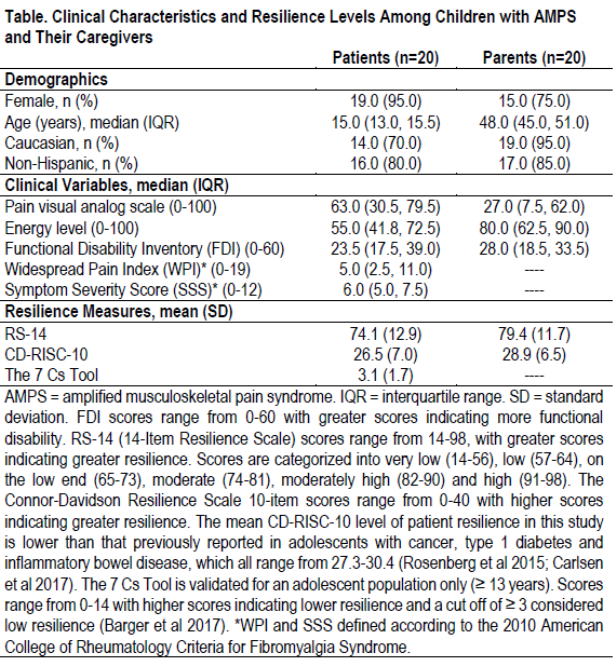Session Information
Date: Monday, October 22, 2018
Session Type: ACR Poster Session B
Session Time: 9:00AM-11:00AM
Background/Purpose: Resilience is a dynamic process of positive adaptation in the context of significant adversity. While higher levels of resilience have been associated with improved physical function and reduced depression and pain in adults with chronic musculoskeletal pain, our knowledge regarding the role of resilience in children with amplified musculoskeletal pain syndrome (AMPS) is limited. We aimed to 1) measure the level of resilience among patients with amplified musculoskeletal pain syndrome and one of their caregivers and 2) determine factors associated with patient resilience.
Methods: This was a prospective inception cohort study of children ages 13-17 years diagnosed with AMPS and one of their caregivers. Eligible subjects were seen for an initial consultation in the pediatric rheumatology pain clinic from March 2018 – May 2018. Subject-caregiver pairs completed online questionnaires including demographic surveys and two measures of resilience: The 14-Item Resilience Scale (RS-14) and the Connor-Davidson Resilience Scale 10-item (CD-RISC-10). Children completed another resilience measure, the 7 Cs Tool. Clinical and demographic variables were abstracted from electronic medical records. We performed multivariate linear regression analyses, using stepwise forward selection with p<0.2, to explore the relationship between patient resilience (using CD-RISC-10) and variables of interest including parental resilience.
Results: 20 patient-proxy pairs were included. The majority of patients were female (75%) and Caucasian (70%). Parents were predominantly mothers (95%) and Caucasian (95%). Table 1 shows other demographic variables. 95% of children had ≥ 1 adverse childhood experience (ACEs) with parental separation being the most common (20%). According to the RS-14, both children and parents had moderate resilience (Table). On the CD-RISC-10, children had a mean score of 26.5 (SD 7.0) and parents had a mean score 28.9 (SD 6.5). This compares to a mean level of resilience of 30.1 (SD 5.3) among a normative student sample (Hartley MT, 2012). According to the 7 C’s Tool, the mean level of patient resilience was low (total score ≥ 3), with a mean of 3.05 (SD 1.7). All measures of resilience were statistically significantly correlated with one another (p<0.05). From the final regression model, higher patient resilience was found to be associated with lower pain scores (β=-0.17), less depression (β=-4.9), more ACEs (β=1.93), older age (β=1.92), and a lower symptom severity score (β=-0.63) (all p<0.02). Parental resilience did not contribute significantly to the model (p>0.2).
Conclusion: Children with AMPS and their parents had low to moderate levels of resilience. Higher patient resilience was associated with lower disease burden among children with AMPS. Resilience-training interventions serve as potential treatment modalities for this patient population.
To cite this abstract in AMA style:
Gmuca S, Urquhart A, Weiss PF, Gerber JS, Sherry DD. The Role of Patient and Parental Resilience in Amplified Musculoskeletal Pain Syndrome [abstract]. Arthritis Rheumatol. 2018; 70 (suppl 9). https://acrabstracts.org/abstract/the-role-of-patient-and-parental-resilience-in-amplified-musculoskeletal-pain-syndrome/. Accessed .« Back to 2018 ACR/ARHP Annual Meeting
ACR Meeting Abstracts - https://acrabstracts.org/abstract/the-role-of-patient-and-parental-resilience-in-amplified-musculoskeletal-pain-syndrome/

